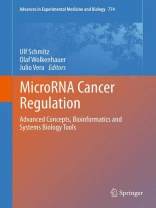This edited reflects the current state of knowledge about the role of micro RNAs in the formation and progression of solid tumours. The main focus lies on computational methods and applications, together with cutting edge experimental techniques that are used to approach all aspects of micro RNA regulation in cancer. We are sure that the emergence of high-throughput quantitative techniques will make this integrative approach absolutely necessary in the near future. This book will be a resource for researchers starting out with cancer micro RNA research, but is also intended for the experienced researcher who wants to incorporate concepts and tools from systems biology and bioinformatics into his work. Bioinformaticians and modellers are provided with a general perspective on micro RNA biology in cancer, and the state-of-the-art in computational micro RNA biology.
Table des matières
Preface.- 1 Micro RNAs in human cancer.- 2 Bioinformatics, non-coding RNAs and its possible application in personalized medicine .- 3 Micro RNA target prediction and validation.- 4 Micro RNA-regulated networks: the perfect storm for classical molecular biology, the ideal scenario for systems biology.- 5 The p53/micro RNA network in cancer: experimental and bioinformatics approaches.-6 Micro RNAs in melanoma biology.- 7 Micro RNA in the lung.- 8 The E2F1-mi RNA cancer progression network.- 9 Modeling of micro RNA-transcription factor networks in cancer.- 10 Coordinated networks of micro RNAs and transcription factors with evolutionary perspectives.- 11 Mathematical modeling of micro RNA-mediated mechanisms of translation repression.- 12 Web resources for micro RNA research.- 13 Discovery of micro RNA regulatory networks by integrating multidimensional high-throughput data.- 14 Discovering the functional micro RNA-m RNA regulatory modules in heterogeneous data.- 15 Elucidating the role of micro RNAs in cancer through data mining techniques.- 16 Working together: Combinatorial regulation by micro RNAs.












